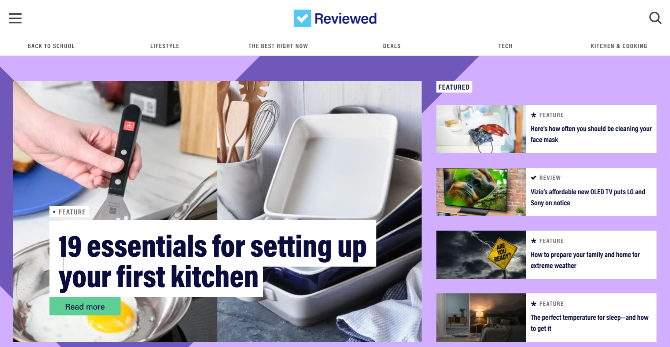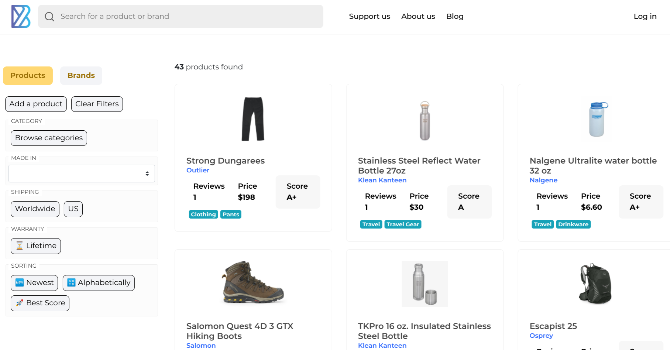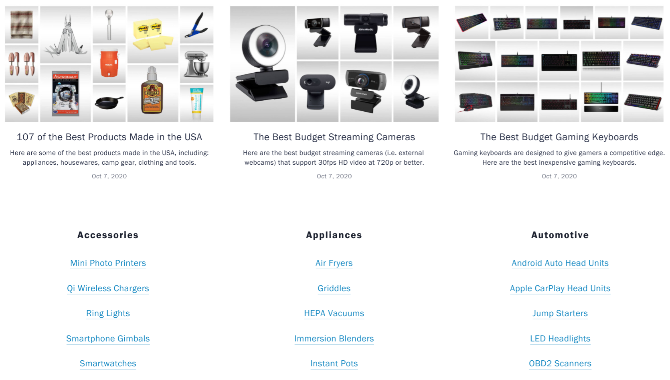Confused about what you should buy? These product recommendations and review websites do the hard work so you can get reliable information for your money.
A Google search for “best dishwasher” or something similar would be a mess of results. You’ll have to sift through fake reviews and unreliable recommendations from search engine-optimized sites to find actually valuable information. When you need trustworthy product recommendations and reviews, these are the sites to go to.
Honorary Mention: Wirecutter
In a list like this, it would be impossible to ignore Wirecutter. It’s the website that started the trend of these Amazon-affiliated, deeply-researched product recommendations. We’ve talked about Wirecutter several times in the past, including in our round-up of sites to find product reviews, compare anything, and decide what to buy.
1. The Strategist (Web): New York Magazine’s Researched Product Recommendations

New York Magazine has a dedicated section for product recommendations called The Strategist. It’s an in-depth review of every type of product imaginable, but often with a twist to the narrative that makes it even more useful.
The articles are a mixture of hands-on research and detailed conversations with experts. For example, when looking for the best window fans instead of air conditioners, the authors talk to hardware store owners. Such experts give the kind of insights from years of experience that you wouldn’t get from a hardware reviewer testing 30 types of fans.
The practical nature of the advice sets apart The Strategist as much as its writing style. Readers of New York Magazine will be well aware of the premium it puts on good writing, and you can expect that here too. While it’s a simple product recommendation list, it’s also an article with a story to it that you’ll want to read.
2. Reviewed.com (Web): Original Reviews of Boring Essentials Like Appliances

Not every product you need is a shiny new iPhone that seduces your wallet. Life is full of essential items like refrigerators, washing machines, water purifiers, bags, fire extinguishers, and other odds and ends. Reviewed.com is perhaps the best and most reliable place to find recommendations for these products.
You only need to go through the How We Test section once to realize how seriously they take it. Reviewed has slowly and painstakingly developed a reputation for first-hand, thorough testing processes that deliver trustworthy reviews. Where most sites rely on Amazon customer reviews or other third-party experiences about such boring products, Reviewed does the hard yards themselves.
Smartly, for the regular reader, they don’t get into the intricacies of these testing methods. If you want to read about them, it’s all available. But when you look for the best cookware sets or washing machines, you’ll get a simple list of recommendations with pros and cons. Click the link and buy it, there’s little reason to keep researching more after Reviewed has given it a thumbs up.
3. Buy For Life and r/BuyItForLife (Web): Durable, Long-Lasting Products by People Who Use Them

The common sensible advice often given is to buy something cheap if it’s the first time you’re using it, and once it breaks due to usage, upgrade to an expensive version. Buy For Life and the community at r/BuyItForLife are all about listing such long-lasting products.
The BuyItForLife subreddit is a place for people to share practicable and durable products that are made to last a long time. Often, this leads to recommendations based on personal experiences, with others chiming in about their own satisfaction. Over time, you’ll find that a few products get a legion of fans for how long-lasting it is. You can even request the community for their tips, but it’s not as common to do that.
Some of the best recommendations are collected on Buy For Life, a crowdsourced directory of long-lasting products. It’s only 43 products at the time of writing, but all of these are well-reviewed by multiple sources. The product page also has reviews, warranty information, and user comments about its long life.
4. Good Cheap and Fast (Web): Find Above-Average Products on Amazon

John DeFeo is the hero you didn’t know you needed. Amazon today is filled with unreliable and fake reviews. Companies game the system to boost their products, and sometimes regular people give a high or low rating when it isn’t deserved. While there are ways to spot fake reviews on Amazon, John is doing the heavy lifting for you to highlight some great deals.
The idea behind Good, Cheap, and Fast (GCF) is to find above-average products selling for below-average prices. John tracks several popular product categories on Amazon, filters out low-rated products, and tracks changes in their prices. Once high-rated products are available for a price less than competitors, it becomes a worthy addition to the list.
Unlike other recommendation sites, John isn’t reviewing any of the products himself. His specialization is in understanding Amazon and Amazon customers. He’s able to weed out different types of suspicious or unhelpful reviews, and then match it to prices, so that you get a fantastic deal.
Each product has a quick synopsis of its pros and cons, based on repeated comments. Also, do read the article content on GCF for other tips, and even disclaimers or warnings to sometimes not bother with a type of product at all. In this too, John does the legwork so you don’t have to. The whole site is ad-free and relies only on affiliate links for revenue.
5. YourStack (Web): Personal Product Recommendations From Tech Community

Developed by the makers of Product Hunt, YourStack is a community for regular users to share the products they use and love. Primarily inhabited by startup, geek, and tech-minded folks, it eschews reviews for user experience.
Browsing the website is a bit difficult and it’s still in its early days. The search function works well though. A quick search for ‘chair’ or ‘phone’ will give you a list of recommendations, along with how many people added that product to their stack. The more people that use it, the better it is likely to be. And users are encouraged to add comments about what they like about it, so you can quickly find these first-hand reviews.
YourStack also has an Experts section where it quizzes people from the startup community about the gear they use. From notebooks to coffee makers, nothing is off the menu here.
Check for Refurbished or Used Items
You might find that many of the recommendations from these websites don’t fit your budget. The best often comes at a price. But looking for refurbished or used items is often a great way to save money while buying long-lasting products.
Of course, you need to properly inspect the item before buying and get it from reliable resellers. But when you know a product is high quality or long-lasting based on one of the sites above, even getting it second-hand might be better than a new purchase for the same price. It’s something worth thinking about.



